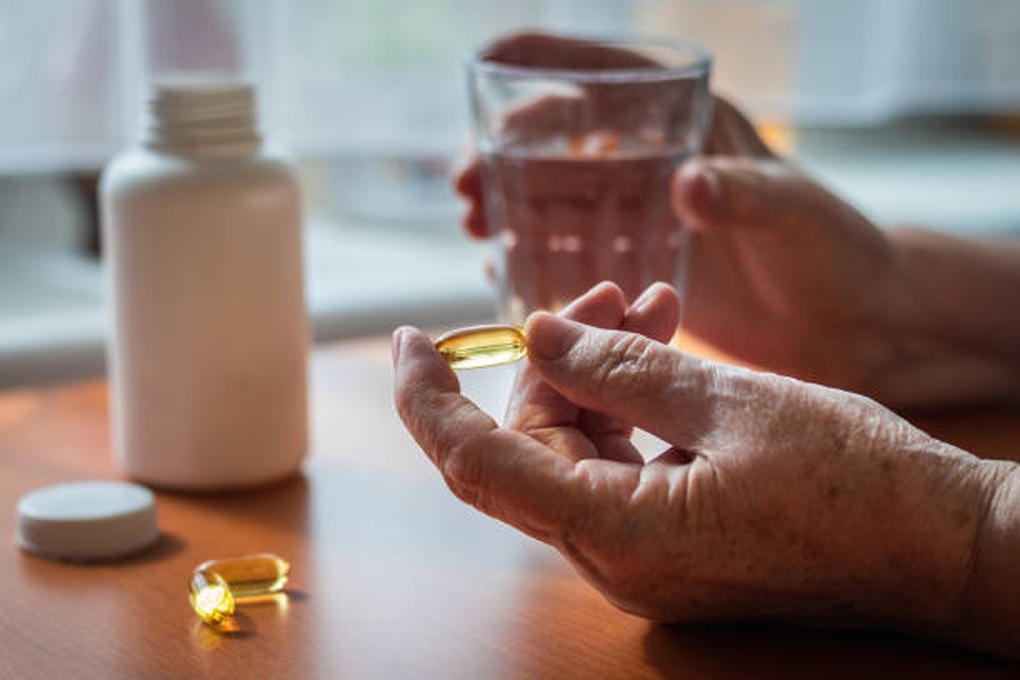Fish oil comes from fatty or oily fish, which are high in omega-3 fatty acids and many contain vitamins A and D.
Science has repeatedly shown that omega-3 fatty acids are an essential part of a balanced diet. They can help lower blood pressure, boost immunity, reduce arthritis, support mental health, and reduce the risk of heart disease and stroke.

Fish oil brings many health benefits (Illustration: iStock)
In addition, according to Dr. Daniel Monti, Sidney Kimmel Medical School (Thomas Jefferson University, USA), omega-3 also has anti-inflammatory properties, helps reduce bad triglyceride levels, and limits oxidation in the body.
Additionally, the two main components of omega-3s - EPA (eicosapentaenoic acid) and DHA (docosahexaenoic acid) - also help increase blood flow and enhance mitochondrial function, where energy is produced in cells.
Omega-3 is found in fatty fish such as salmon, mackerel, herring, sardines and tuna. However, marine animals are not the only source of omega-3. People can supplement omega-3 through algae, seaweed, along with flaxseeds, chia seeds, walnuts, soybeans, hemp seeds, eggs or milk.
Most importantly, according to Professor JoAnn Manson, Brigham and Women's Hospital, Harvard University, omega-3 should be supplemented from food instead of depending on pills to ensure biological effectiveness and reduce the risk of overdose.
According to Jim White, a nutritionist with the American Council on Exercise , there is no specific "golden hour" to take fish oil. The most important thing is to maintain a regular daily routine, whether morning or night.
However, because fish oil is fat-soluble, it is best for people to take it after meals to help with better absorption and limit side effects such as heartburn, acid reflux or nausea.
According to nutritionist Keri Gans (author of The Small Change Diet ), you should take fish oil during or after meals, especially high-fat meals like eggs, yogurt, avocado, salmon, peanut butter, or cooking with olive oil.
Avoid taking fish oil on an empty stomach or with a meal that is very low in fat. If you do not normally eat breakfast or have a low-fat breakfast, switch to taking fish oil at lunch or dinner.
Not all fish oils are created equal. People should choose fish oils in the natural triglyceride or re-esterified triglyceride form, as they are better absorbed by the body than the ethyl ester form.
According to Jim White, the average dose is 250-500 mg EPA+DHA per day for healthy people. People at risk of cardiovascular disease may need higher doses but should consult a doctor before using high doses or for a long time.
Source: https://dantri.com.vn/suc-khoe/thoi-diem-tot-nhat-trong-ngay-de-uong-dau-ca-20250516160921243.htm


![[Photo] President Luong Cuong attends the 80th Anniversary of the Traditional Day of Vietnamese Lawyers](https://vphoto.vietnam.vn/thumb/1200x675/vietnam/resource/IMAGE/2025/10/09/1760026998213_ndo_br_1-jpg.webp)

![[Photo] Prime Minister Pham Minh Chinh chairs a meeting of the Government Standing Committee on overcoming the consequences of natural disasters after storm No. 11](https://vphoto.vietnam.vn/thumb/1200x675/vietnam/resource/IMAGE/2025/10/09/1759997894015_dsc-0591-jpg.webp)


![[Photo] General Secretary To Lam visits Kieng Sang Kindergarten and the classroom named after Uncle Ho](https://vphoto.vietnam.vn/thumb/1200x675/vietnam/resource/IMAGE/2025/10/09/1760023999336_vna-potal-tong-bi-thu-to-lam-tham-truong-mau-giao-kieng-sang-va-lop-hoc-mang-ten-bac-ho-8328675-277-jpg.webp)























































































Comment (0)